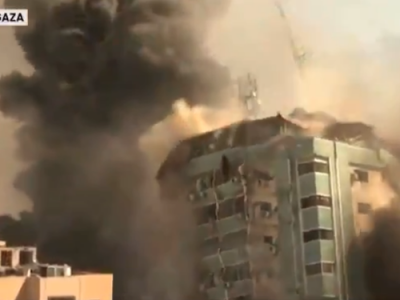Israel’s Air Strikes on Gaza Could Amount to War Crimes, Report Finds

All Global Research articles can be read in 51 languages by activating the “Translate Website” drop down menu on the top banner of our home page (Desktop version).
Visit and follow us on Instagram at @crg_globalresearch.
***
The air strikes which destroyed four high-rise buildings in Gaza in May violated international law and could amount to Israeli war crimes, a human rights group report revealed today.
The attacks also damaged neighbouring structures, made several dozen families homeless and shuttered scores of businesses that provided livelihoods to many people, Human Rights Watch said.
Between May 11 and 15, Israeli forces attacked the Hanadi, al-Jawhara, al-Shorouk and al-Jalaa towers in the densely populated al-Rimal neighbourhood of Gaza City.
Israel said that they warned tenants of the impending attacks in order to allow for evacuation. Three buildings were then immediately levelled while a fourth sustained extensive damage and is due for demolition.
While Israeli authorities claimed that Palestinian armed groups were using the towers for military purposes, they have not provided evidence to support the allegations.
Human Rights Watch crisis and conflict researcher Richard Weir said:
“The apparently unlawful Israeli strikes on four high-rise towers in Gaza City caused serious, lasting harm for countless Palestinians who lived, worked, shopped, or benefited from businesses based there.
“The Israeli military should publicly produce the evidence that it says it relied on to carry out these attacks.”
Between May and August, Human Rights Watch interviewed 18 Palestinians who were witnesses and victims of the attacks on the towers, including residents, business owners, employees and those in affected neighbouring structures.
The group also reviewed video footage and photographs taken after the attacks, and statements by Israeli and Palestinian officials and Palestinian armed groups.
Jawad Mahdi, 68, an owner of al-Jalaa tower who lived there with dozens of family members, said: “It was a place of living, safety, children and grandchildren, all our history and life — destroyed in front of our eyes.
“It’s like someone ripping your heart out and throwing it.”
The long-term effects of the attacks extend beyond the immediate destruction of the buildings, Human Rights Watch said.
Many jobs were lost with the closure of their companies and many families were displaced.
Human Rights Watch found no evidence that members of Palestinian groups involved in military operations had a current or long-term presence in any of the towers at the time they were attacked.
Even if there were such a presence, the attacks appeared to cause foreseeably disproportionate harm to civilian property, the group said, which is in breach of international humanitarian law.
*
Note to readers: Please click the share buttons above or below. Follow us on Instagram, @crg_globalresearch. Forward this article to your email lists. Crosspost on your blog site, internet forums. etc.
Featured image is from Zero Hedge

